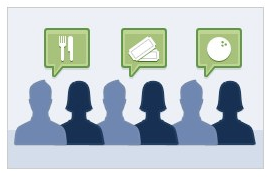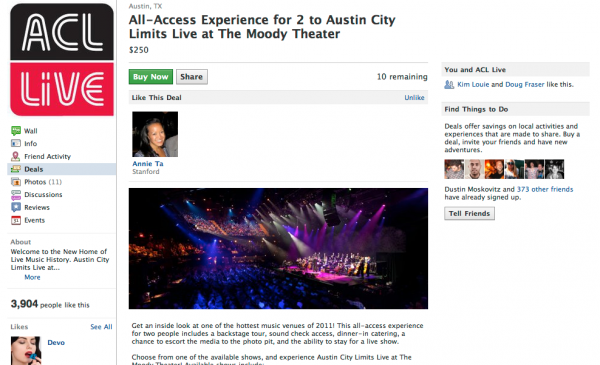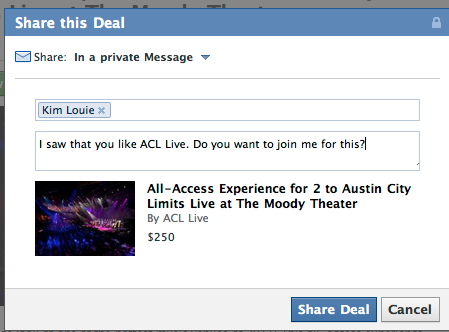After several months of anticipation Facebook is launching its second deals program: Social Deals. The new effort more closely resembles Groupon-style daily deals, with several twists. The original “Facebook Deals” is now being called “check-in deals” to distinguish it from the new program. Check-in deals are free to users; they’re mobile centric and operate like […]
 After several months of anticipation Facebook is launching its second deals program: Social Deals. The new effort more closely resembles Groupon-style daily deals, with several twists. The original “Facebook Deals” is now being called “check-in deals” to distinguish it from the new program.
After several months of anticipation Facebook is launching its second deals program: Social Deals. The new effort more closely resembles Groupon-style daily deals, with several twists. The original “Facebook Deals” is now being called “check-in deals” to distinguish it from the new program.
Check-in deals are free to users; they’re mobile centric and operate like conventional coupons. By contrast Facebook’s new Social Deals, like Groupon or LivingSocial, must be purchased up front using money or Facebook Credits (the first use for real-world products/services). You actually buy a voucher that is then redeemed offline.
Focused on Local Businesses
Check-in Deals are directed toward national entities and small businesses alike. However Social Deals are more focused on local businesses. They contemplate friends discovering, planning and coming together for offline events and experiences.
The intention here is to make the Facebook online experiences translate into real-world experiences. There will be a five city trial to start: Atlanta, Austin, Dallas, San Diego, San Francisco. There will also be 11 partners that will provide deals to Facebook:
- Gilt City
- Home Run
- FreshGuide
- PoweredByTippr
- KGB
- Plumdistrict
- Zozi
- OpenTable
- ReachLocal/DealOn
- Viagogo
- aDealio
Social Deals represents potentially significant additional distribution and reach for the 11 partner sites. For its own deals, Facebook is using an internal sales force to sell directly to SMBs.
Making Deals More Social
Facebook will try to field deals that are more “social” in nature (e.g., events) vs. more traditional daily deals (e.g., cosmetic dentistry). One such example is a VIP experience at the theater where “Austin City Limits” (ACL) is produced and performed.
 As an aside, note the deals link in the left nav of the ACL page above. Here’s a description of this particular deal:
As an aside, note the deals link in the left nav of the ACL page above. Here’s a description of this particular deal:

Like Before You Buy
Another thing to notice about the ACL deal is that there’s no associated discount, a hallmark of traditional daily deals: “50 to 90 percent off.” However this is precisely the type of offline social experience that Facebook is seeking to promote with the new program.
Another difference: you can Like deals without buying them — or before buying them. If you Like a deal it will be exposed through your feed.
You can also share and privately invite selected friends and ask them to join you or expose them to a deal. Facebook users can message each other and discuss the deal as a group before collectively buying. (Not all deals will be targeted toward groups.)
Like traditional daily deals Facebook Social Deals will come through email but also through the Facebook news feed. And they may potentially be exposed via Facebook Ads as well.


More Merchant Control, Including Caps
The notion here, as with Facebook check-ins, is that the new deals are supposed to be “social from the ground up.” Beyond the effort to to make them more social for consumers there are also important differences from conventional daily deals on the merchant side.
As mentioned Facebook Social Deals won’t always involve discounts. Merchants will also be permitted to set caps on how many deal vouchers can be purchased. This is typically not allowed on more traditional daily deal sites.
Another interesting angle is that merchants will be required to have Facebook Pages before they can participate. While many already do — 40 percent to as much as 60 percent-plus of SMBs have some sort of Facebook presence — this requirement creates a more structured way to capture and retain new customers.
Preventing the “One Night Stand”
Small businesses have sometimes struggled to translate daily deal buyers into repeat customers. By connecting deals and Facebook Pages, the company makes an effort to solve the problem of the “one night stand.”
With Facebook Social Deals local merchants can direct new customers to Like them on their Page and — voilà — they have a CRM platform. Merchants can then potentially start a “conversation” with these new customers.
While many SMBs set up a Page and then wonder “What now?,” Facebook’s Emily White says deal buyers (new customers) will help flesh out and populate content on SMB Facebook Pages. Indeed, this is the secondary mission of Social Deals — to get more SMBs to create and then really use Facebook Pages.
The new program will obviously compete with Groupon, LivingSocial and other deal sites, including the new Google Offers. While many who write about Social Deals will be tempted to use the headline “Facebook launches Groupon Killer,” there’s room for multiple winners in the deals space.
What Took ’em So Long?
When I first heard about Groupon a couple of years ago, I immediately thought of Facebook. The model is a natural for the company. Now they’re finally implementing it.
Facebook could still blow the execution; hence the five-city test. But I suspect over the long term this will be a very successful product for Facebook and the merchants involved.
While Social Deals isn’t fully original, neither is it a “me-too” product in the way that Google Offers appears to be an “incredible simulation” of Groupon.
“Everything from discovery, to conversation to planning and going; every aspect of the deal is social,” Facebook’s Emily White told me earlier today. “We’re going after social experiences,” she said. “There won’t be any teeth whitening.”


